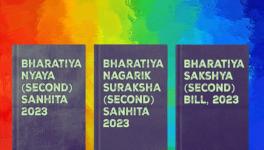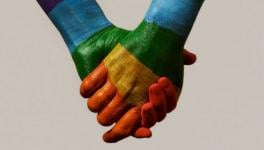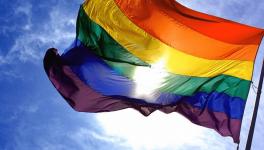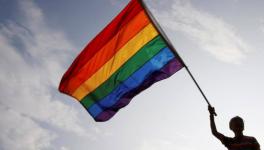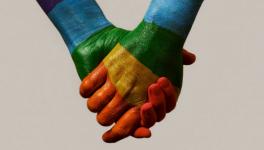Decoding Discrimination Against Same-Sex Couples
A five-judge constitutional bench of the Supreme Court is hearing arguments in the marriage equality case. It’s only fair to ask whether same-sex couples have the same legal rights as heterosexual adults. Marriage guarantees most opposite-sex couples a bundle of rights and privileges—maintenance and alimony, custody of children, rules for the inheritance and succession of property, and the right to divorce, and marriage brings social acceptance.
At this pivotal moment, the possibility of enlarging some of these rights to same-sex couples is under consideration. The Special Marriage Act 1954, the Foreign Marriage Act 1969, the Hindu Marriage Act 1955, the Citizenship Act, and the Transgender Persons Protection of Rights Act 2019 have been scrutinised at the hearings.
The ideas of family and parenthood are indeed in transition in India, and there is a firm swing away from joint to nuclear families, perhaps even to single parenthood. But there’s little to no discussion on the role of anti-discrimination laws in securing citizens’ rights, which become crucial as these ideas change. Recall that anti-discrimination is the focal point of the demand for marriage equality—but there is no attention to discriminatory practices against same-sex couples in areas beyond family law and marriage.
Rights of admission reserved
Imagine a notice outside a wedding venue that reads: ‘Same-sex Marriages Not Conducted Here’, a hotel sign that says, ‘No Reservations for Same-sex Couples Accepted’, and so on. Recently, a restaurant in Assam emblazoned on its menu: ‘We don’t serve people of doubtful citizenship/illegal immigrants.’
Therefore, India is not new to denying access based on inequality or differences of status and hierarchy, especially in the context of caste. However, ‘modern’ public spaces should not resemble colonial spaces, which alienated some and permitted others based on their whims. Segregation based on sexual identity, such as at clubs, workplaces, or restaurants, would exacerbate discrimination.
Economist Amartya Sen’s social choice theory, which won him the 1998 Nobel Prize in economics, distinguishes availability from access to resources. Examining deaths during the Bengal famine, he found that the godowns had food grains, but the people could not access them due to what Sen terms “entitlement failure”. In other words, every person can be considered entitled to goods and services. Further, entitlements are bundles of goods and services from which a person can choose one or some. Therefore, the logic is simple—to prevent an “entitlement failure”, public policy must bridge the gap between availability and access.
Brought to the same-sex couples’ context, the availability-access question would be: if they have a legal right to facilities offered by businesses and non-profits, does it mean they are actually able to access them?
Where marriages of same-sex couples do have social and familial approval to the point that they will participate in the ceremonies, it will be a public event—which comes at a high monetary cost. The public nature of marriage—its element of spectacle—is also where bias and discrimination come into play. At each step of wedding planning, from caterers and decorators to venues and transport services, all or any can deny services or create new rules to deny access to same-sex partners. In such a situation, can a couple sue for denial of service because of their convictions on marriage, as in the United States?
This may not survive a legal challenge in India because Article 19(1)(g) of the Constitution only guarantees freedom of trade, profession, occupation, or business. The provision does not overtly protect litigants from discriminatory business practices. Further, Article 15 says the State shall not discriminate based on religion, race, caste, sex, or place of birth. Must it be amended to include denial of service in its protections?
In the Navtej Singh Johar case, the Supreme Court expanded the narrow view that any ground of discrimination, direct or indirect, founded on a particular understanding of the role of sex, is discrimination under Article 15. Therefore, it covers sexual orientation and gender identity. Unfortunately, gaps remain. For instance, the Consumer Protection Act 2019 (CPA) empowers a consumer to sue for a deficiency of a good or service only after it has been provided. In other words, the CPA does not foresee discrimination before a service has been provided. If it were the case, the law would have made businesses more conscious of their conduct. The bottom line is that denial of service will hurt the ability of same-sex couples to enjoy goods and services opposite-sex couples can take for granted.
Who will solemnise marriages?
Thirty-four countries recognise same-sex marriages, but India’s case is unique, given its cultural and religious plurality. So can discrimination claims legally be brought against religious organisations or individual priests who refuse to solemnise marriages of same-sex couples? Should courts interfere if religious groups demonstrate prejudices such as sanctions, temporary bans or censure of same-sex couples seeking to marry? Even if same-sex marriage is accepted in the religious or spiritual domain, what safeguards are required to protect such a couple from social stigma and taboos? Most importantly, will same-sex couples enjoy the reciprocity of marriage in other countries the way opposite-sex couples do?
A silver lining in this regard is the Arya Samaj, which views the varna system as based on professional and educational criteria rather than caste at birth, allowing inter-caste marriages. In England and Wales, same-sex marriage and same-sex civil partnerships have similar rights, paved the way for acceptance.
Discrimination in housing
The right to shelter set forth by the Supreme Court in Chameli Singh vs State of Uttar Pradesh includes the right to live in any civilised society with access to proper food and water, a clean environment, education, shelter, medical care, and rights related to mental, physical, intellectual and spiritual growth. Without these, no human being can be a useful citizen, perform their fundamental duties, or participate in the democratic process.
However, legalising same-sex marriage will not change much if same-sex couples still face discrimination when renting or buying property, arbitrary evictions, rent exploitation, and other restrictions based on traditional assumptions of what constitutes a family.
In Obergefell v Hodges, 2015, the United States Supreme Court recognised same-sex marriage reaffirming a dynamic theory of constitutional law that takes account of “society’s evolving experience and evolving law of families”. Justice Kennedy observed that marriage laws harmed the children of same-sex couples because ‘without the recognition, stability, and predictability marriage offers, the children of same-sex couples suffer the stigma of knowing their families are somehow lesser’.
Any law that creates sex-based classification would militate against the foundation of Article 14. The philosopher Giorgio Agamben, who distinguishes citizens from subjects as those who enjoy rights versus those who obey the laws, says that the State of exception is “a zone of indistinction” in which “there is no difference between law and force, wherein individuals are subjects to the law but not subjects in the law”.
Put another way, if the law marginalises same-sex couples, preventing them from accessing any rights, any legal recognition they do get might also prove less effective than it could be. If it follows that since discrimination is legally undefined, the instances of same-sex couples not being treated as equals to opposite-sex couples will curtail the extent of marriage equality. Finally, if religious superiority and cultural supremacy hold sway in the garb of maintaining traditional social harmony, equality will remain an unrealised dream for LGBTQIA+.
The author is an assistant professor at St Joseph’s College of Law, Bangalore. The views are personal.
Get the latest reports & analysis with people's perspective on Protests, movements & deep analytical videos, discussions of the current affairs in your Telegram app. Subscribe to NewsClick's Telegram channel & get Real-Time updates on stories, as they get published on our website.










